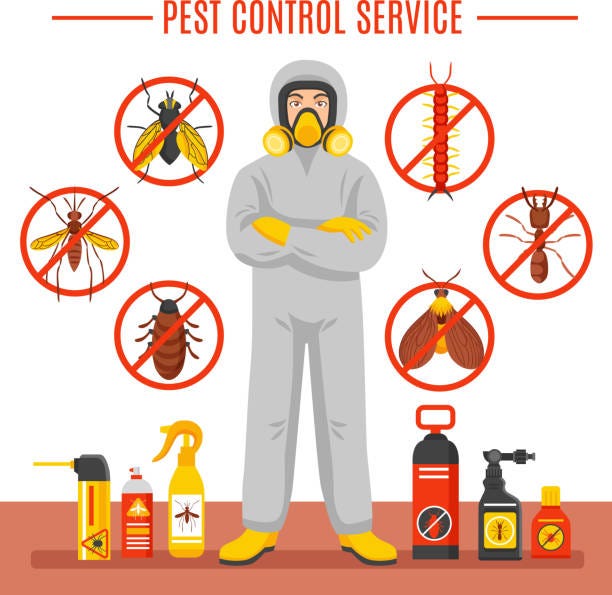A1 Charlotte Pest Control Companies - Your Local Pest Specialists
A1 Charlotte Pest Control Companies - Your Local Pest Specialists
Blog Article
Bed Insect Therapy Failure: Comparing Chemical Vs. Non-Chemical Solutions
In the world of parasite control, specifically when managing the consistent issue of bed insects, the option in between chemical and non-chemical therapy solutions can be a critical one. Both techniques offer distinctive benefits and drawbacks, affecting variables such as performance, safety and security factors to consider, and total cost. By checking out the nuanced details of each method, a clearer understanding of which course to go after in addressing a bed bug infestation can be attained.
Efficiency of Chemical Treatments
Chemical therapies for bed bug problems have been widely acknowledged for their fast and potent efficiency in removing these insects. When taking into consideration the performance of chemical therapies, it is crucial to comprehend that they can supply a quick and thorough option to a bed pest trouble. Professional pest control specialists commonly depend on insecticides to target bed insects at numerous stages of their life cycle, consisting of adults, fairies, and eggs. These chemicals normally function by interfering with the bed bugs' nerves, leading to paralysis and ultimate death.
Moreover, chemical treatments have the benefit of offering residual impacts, suggesting that they can continue to remove bed insects also after the first application. This recurring activity is specifically advantageous in combating any type of potential re-infestations. Additionally, the fast action of chemical treatments can bring relief to people facing extreme bed pest problems, enabling them to restore control of their home promptly.
Security Worries With Chemical Solutions
When using chemical options for bed bug treatment is making certain the security of occupants and the setting,One essential element that calls for careful consideration. While chemical therapies can be efficient in getting rid of bed insects, they might pose dangers if not handled appropriately. Among the key safety worry about chemical remedies is the possible injury they can cause to human wellness. Exposure to certain chemicals made use of in bed insect treatments can bring about breathing issues, skin irritability, or other damaging responses, specifically in individuals with pre-existing problems or level of sensitivities. Additionally, improper application or dose of chemical pesticides can cause poisonous residues sticking around in the treated location, posing long-lasting health threats to residents.
Moreover, the environmental influence of chemical solutions is one more substantial consideration. Some chemicals utilized in bed pest therapies may be unsafe to advantageous pests, wildlife, and ecological communities if they seep right into the soil or water systems. It is important to utilize chemical therapies judiciously, adhering to safety and security guidelines, and considering less poisonous alternatives to alleviate these dangers and ensure the risk-free and learn the facts here now efficient management of bed bug invasions.
Advantages of Non-Chemical Techniques
Thinking about the possible safety and security concerns and environmental influence associated with chemical remedies for bed pest therapy, exploring non-chemical methods offers a promising choice with a number of unique advantages. Non-chemical treatments are environmentally friendly, as they do not add to air or water air pollution, making them a lasting choice for parasite control.
Additionally, non-chemical solutions can be reliable in targeting bed pests, consisting of hard-to-reach locations where chemical treatments might not pass through - A1 charlotte pest control companies. Techniques such as warmth treatment, vacuuming, steam cleansing, and bed mattress coverings supply thorough eradication without the use of hazardous chemicals.
Limitations of Non-Chemical Treatments

Additionally, non-chemical therapies commonly require several applications to achieve successful removal. This can be taxing and might not constantly ensure total elimination of all bed insects and their eggs, specifically in hard-to-reach or surprise places.
Additionally, the success of non-chemical therapies heavily depends on correct execution and thoroughness, which can be testing for people without professional expertise. Insufficient application of non-chemical approaches may result in insufficient eradication, causing relentless problems and the requirement for added treatments.
Consequently, while non-chemical treatments have their advantages, it is necessary to acknowledge these constraints and consider them when determining one of the most efficient method for taking care of bed insect invasions.
Price Comparison: Chemical Vs. Non-Chemical Options
Offered the restrictions connected with non-chemical therapies, a necessary element to examine in the context of bed pest management is the price comparison between chemical and non-chemical choices. In contrast, non-chemical therapies like heat treatment or vapor can be a lot more pricey, with prices varying from $1,000 to $6,000 for a whole home. While the preliminary price of chemical treatments might seem reduced, numerous treatments might be required to totally eliminate the problem, possibly increasing the total price.
Conclusion

Considering the possible safety concerns and environmental impact associated with chemical solutions for bed pest therapy, checking out non-chemical techniques offers an appealing option with a number of distinctive advantages.Provided the restrictions linked with non-chemical therapies, a vital aspect to examine in the context of bed pest administration is the expense comparison in between chemical and non-chemical alternatives. In contrast, non-chemical treatments like warm therapy or steam can be more pricey, with expenses varying from $1,000 to $6,000 for an entire home. While the first expense of chemical treatments may seem reduced, several therapies might be needed to totally get rid of the invasion, potentially raising the overall expense.In verdict, when contrasting chemical and non-chemical bed pest treatment choices, it is vital to take into consideration effectiveness, security, advantages, limitations, and cost.
Report this page